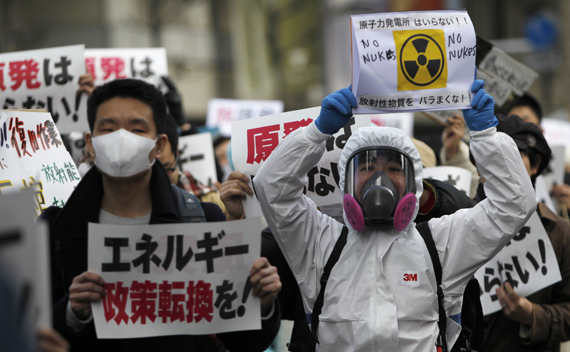Japan’s Nuclear Quandary (continued)
More on:

Partisan politics aside, public confidence in industry and government has plummeted. Credibility of data marshaled to date in support of the conclusion that Japan’s reactors are safe has been undermined, and media polls reveal a steady drop in public support for Japan’s existing nuclear energy policy.
A broader debate in Japan is unfolding, and the temptation is to draw the battle lines so that industry and government are on one side and Japan’s citizens are on the other. But this would be a flawed—and from a policy perspective, deeply damaging—premise.
Japan has been here before. As Japan’s business and government leaders consider how to move forward today, it might be helpful to look back, and remember that the trade-off between Japan’s economic vibrancy and the health of Japan’s citizens has already been demonstrated to be a false dichotomy. In the early 1970s, Japan confronted a similar moment of reckoning when the environmental damage created serious health risks for communities in proximity to industrial sites. At that time, the national government refused to mediate the conflict, and wrote it off as a local problem. Eventually, Japan’s courts weighed in on the liability of companies that had polluted the streams and waters by filling them with mercury and other poisons that destroyed the health of Japanese citizens. The end result was a reformulation of industrial regulation, and some of the best technologies and practices for environmental protection to emerge in the twentieth century.
But the 1970s also produced evidence of proactive leadership in Japan. During that decade, Japan’s economy was buffeted by extraordinary “shocks” emanating from the global market. The world’s currency markets were upended, the U.S. embargoed soybean exports, and, perhaps the greatest blow, oil prices skyrocketed. Yet Japan’s industry and government initiated wholesale reforms—restructuring the industry and introducing the energy conservation measures that today have made Japan one of the leading global forces in environmental technologies.
In the face of a serious energy crisis in the past, Japan demonstrated its capacity to be far more resilient and far more innovative than any other advanced industrial society in energy conservation approaches, all the while implementing assiduously new environmental protection policies. The quality of air and water in Japan was largely restored within a decade, and the shift in consumer preferences towards environmentally sound automobiles and other consumer goods led to the new technologies developed by Japan’s major manufacturers that are competitive around the globe. Japan’s citizens, industry and government can all claim their full share of credit in the accomplishments of that era.
No one wants to see Japan’s economy crippled, nor its energy supply disrupted. But the imperative for devising better safeguards for nuclear energy is abundantly clear. With transparent safeguards, and a more even-handed oversight mechanism, local leaders and communities may be better positioned to sign on to the short-term energy needs of the country. Japan’s nuclear industry has a major role to play in the national effort to ensure the safety of its reactors.
Moreover, global efforts to devise a scientific standard for evaluating radiation exposure are long overdue. With so much of the world now dependent on nuclear energy for power generation, it is about time a serious effort at global capacity-building for the measurement, evaluation and mitigation of risk be strengthened.
Japan has to lead the way. Falling back on political expediency, cutting corners and rehashing yesterday’s politics—the very practices that many think may have led to this crisis—is no solution. Innovation in policy management, coupled with a credible demonstration that safety and efficiency can go hand-in-hand, offers a more constructive approach to reassuring Japan’s citizens that they are safe.
Underneath the heightened emotions on display in Japan’s nuclear debate, the nation is deeply divided over what Fukushima Daiichi means for Japan’s future. While it might be easy to blame this particular government or that particular company, most Japanese understand that the development of nuclear energy was indispensable to their economic development strategy in the past.
The role of nuclear energy in Japan’s future remains to be seen. Perhaps it is too early for a grand decision. For the moment, devising factually correct assessments of the state of Japan’s reactors is paramount. Beyond that is a broader global conversation on how to ensure the safety of nuclear power.
We should not forget that Japan’s nuclear debate is not simply about energy policy. The anniversaries of the atomic bombing of Hiroshima (August 6) and Nagasaki (August 9) will force a moment of deep and troubling reflection for many Japanese. To date, these national memorials have produced unequivocal statements about Japan’s continued commitment to rid the world of nuclear weapons.
This year, crafting Japan’s nuclear message will be far more difficult. The entire nation will be listening. We should be, too.
More on:
 Online Store
Online Store
